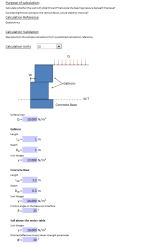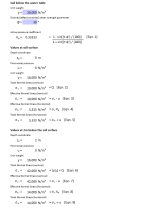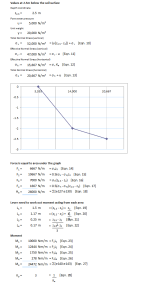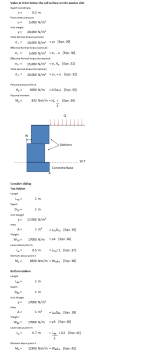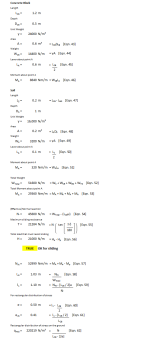Analysis of gabions.xls
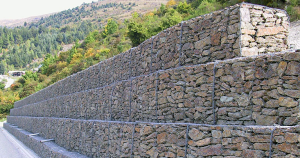
Description
Purpose of calculation:
Calculate whether the wall will slide forward? Calculate the bearing pressure beneath the base? Considering friction acting on the vertical faces, would stability improve?
Calculation Reference
Geotechnics
Calculation Validation
Reproduction of a sample calculation from a published calculation reference
Calculation Reference
Geotechnics
A gabion is a wire mesh basket or cage filled with stones or other materials and used for erosion control, slope stabilization, retaining walls, and other civil engineering applications. The wire mesh is typically made of galvanized steel and is woven into a hexagonal or rectangular pattern, creating a flexible and durable structure that can conform to the shape of the ground and resist the forces of soil and water. The stones or other materials used to fill the gabion can be chosen for their aesthetic, environmental, or functional properties, and can range from small pebbles to large boulders. Gabions have been used for centuries as a cost-effective and sustainable solution for civil engineering projects, and they offer several advantages over other types of structures, including their permeability, flexibility, and ease of construction.
The analysis of gabions in terms of slip bearing and stability involves assessing the capacity of the gabions to resist the shear stresses and the potential for the gabions to slip or overturn under loading conditions. The analysis can be performed in the following steps:
- Determine the geometry and dimensions of the gabion structure, including the height, width, and length of the gabion units, the spacing of the units, and the slope angle of the structure.
- Determine the properties of the soil or rock foundation, including the bearing capacity, the shear strength, and the potential for soil or rock sliding.
- Calculate the weight of the gabion structure and the loads acting on the structure, such as the weight of the soil or water retained by the gabions, the hydrostatic pressure of the water, and any additional loads or surcharges.
- Determine the shear strength of the gabions and the potential for slip or overturning, using methods such as limit equilibrium analysis, finite element analysis, or other numerical methods.
- Compare the calculated shear strength and stability of the gabion structure to the calculated shear stresses and loads acting on the structure, using a factor of safety. The factor of safety is the ratio of the strength to the stress, and it should be greater than 1.0 to ensure the stability of the gabion structure.
- Determine the required measures to improve the stability of the gabion structure if necessary, such as increasing the size or spacing of the gabions, adding additional reinforcements, or improving the foundation soil or rock.
Overall, the analysis of gabions in terms of slip bearing and stability is important to ensure the safety and effectiveness of the gabion structure in retaining soil or water and resisting external loads and forces. The analysis requires a thorough understanding of the properties of the gabions, the foundation, and the loading conditions, and it should be performed by qualified and experienced engineers using appropriate methods and techniques.
Calculation Preview
Full download access to any calculation is available to users with a paid or awarded subscription (XLC Pro).
Subscriptions are free to contributors to the site, alternatively they can be purchased.
Click here for information on subscriptions.

